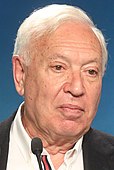 | |||||||||||||||||||||||||||||||||||||||||||||
| |||||||||||||||||||||||||||||||||||||||||||||
3,082 delegates in the 19th National Congress of the PP Plurality of delegates needed to win | |||||||||||||||||||||||||||||||||||||||||||||
|---|---|---|---|---|---|---|---|---|---|---|---|---|---|---|---|---|---|---|---|---|---|---|---|---|---|---|---|---|---|---|---|---|---|---|---|---|---|---|---|---|---|---|---|---|---|
| Opinion polls | |||||||||||||||||||||||||||||||||||||||||||||
| Registered | 67,083 (primary) | ||||||||||||||||||||||||||||||||||||||||||||
| Turnout | 58,304 (86.9%) (primary) 2,973 (96.5%) (congress, president) 2,971 (96.4%) (congress, board) | ||||||||||||||||||||||||||||||||||||||||||||
| |||||||||||||||||||||||||||||||||||||||||||||
 Autonomous community results map | |||||||||||||||||||||||||||||||||||||||||||||
| |||||||||||||||||||||||||||||||||||||||||||||
The 19th National Congress of the People's Party, officially the 19th Extraordinary National Congress, was held in Madrid from 20 to 21 July 2018, to renovate the governing bodies of the People's Party (PP) and establish the party's main lines of action and strategy for the next leadership term. A primary election to elect the new party president was held on 5 July. The congress was called by the party's National Board of Directors on 11 June as a consequence of former Spanish prime minister Mariano Rajoy's resignation as PP leader on 5 June,[1][2][3] following the motion of no confidence that had voted his government down on 1 June. The leadership election was the first whereby PP members directly participate in choosing a leader for the party. On 26 June 2018, it was announced that only 66,706 PP members out of the 869,535 reported by the party had registered to vote in the election.[4][5][6]
Former deputy prime minister Soraya Sáenz de Santamaría and the party's vice secretary-general of Communication Pablo Casado topped the poll in the primary election held on 5 July 2018, becoming eligible for the run-off to be held among the party's delegates on 20−21 July. After preliminary data was published, Sáenz de Santamaría conceded the election and acknowledged Casado's victory. Casado's win, which was considered a party swing towards the right, was possible through the support to his candidacy of former party secretary-general María Dolores de Cospedal, who had been a bitter rival of Santamaría during the PP's time in government.[7][8][9]
- ^ Hernández, Marisol (5 June 2018). "Rajoy se va: "Es lo mejor para mí, para el PP y para España"". El Mundo (in Spanish). Madrid. Retrieved 5 June 2018.
- ^ de Diego, Sara; Collado, Ángel (5 June 2018). "Rajoy dimite como presidente del PP: "Es lo mejor para mí, para el partido y para España"". El Confidencial (in Spanish). Retrieved 5 June 2018.
- ^ "PP celebrará el próximo lunes la Junta para convocar congreso extraordinario". La Vanguardia (in Spanish). Madrid. EFE. 5 June 2018. Retrieved 5 June 2018.
- ^ "El PP cierra en 66.706 el número de afiliados que finalmente votará en las primarias". El Economista (in Spanish). Europa Press. 4 July 2018. Retrieved 5 July 2018.
- ^ Collado, Ángel (26 June 2018). "Sólo 66.384 militantes del PP (el 7,6 %) se inscriben para votar al sucesor de Rajoy". El Confidencial (in Spanish). Retrieved 26 June 2018.
- ^ Mateo, Juan José (26 June 2018). "Solo el 7,6% de los afiliados del PP elegirán al sucesor de Rajoy". El País (in Spanish). Madrid. Retrieved 26 June 2018.
- ^ "Spain: People's Party picks Pablo Casado as new leader". Al Jazeera. 21 July 2018. Retrieved 22 July 2018.
- ^ Junquera, Natalia (21 July 2018). "Pablo Casado vence en el congreso del PP y consuma el giro a la derecha". El País (in Spanish). Madrid. Retrieved 4 November 2021.
- ^ "Alianza Popular / Partido Popular". Historia Electoral.com (in Spanish). Retrieved 16 March 2023.






